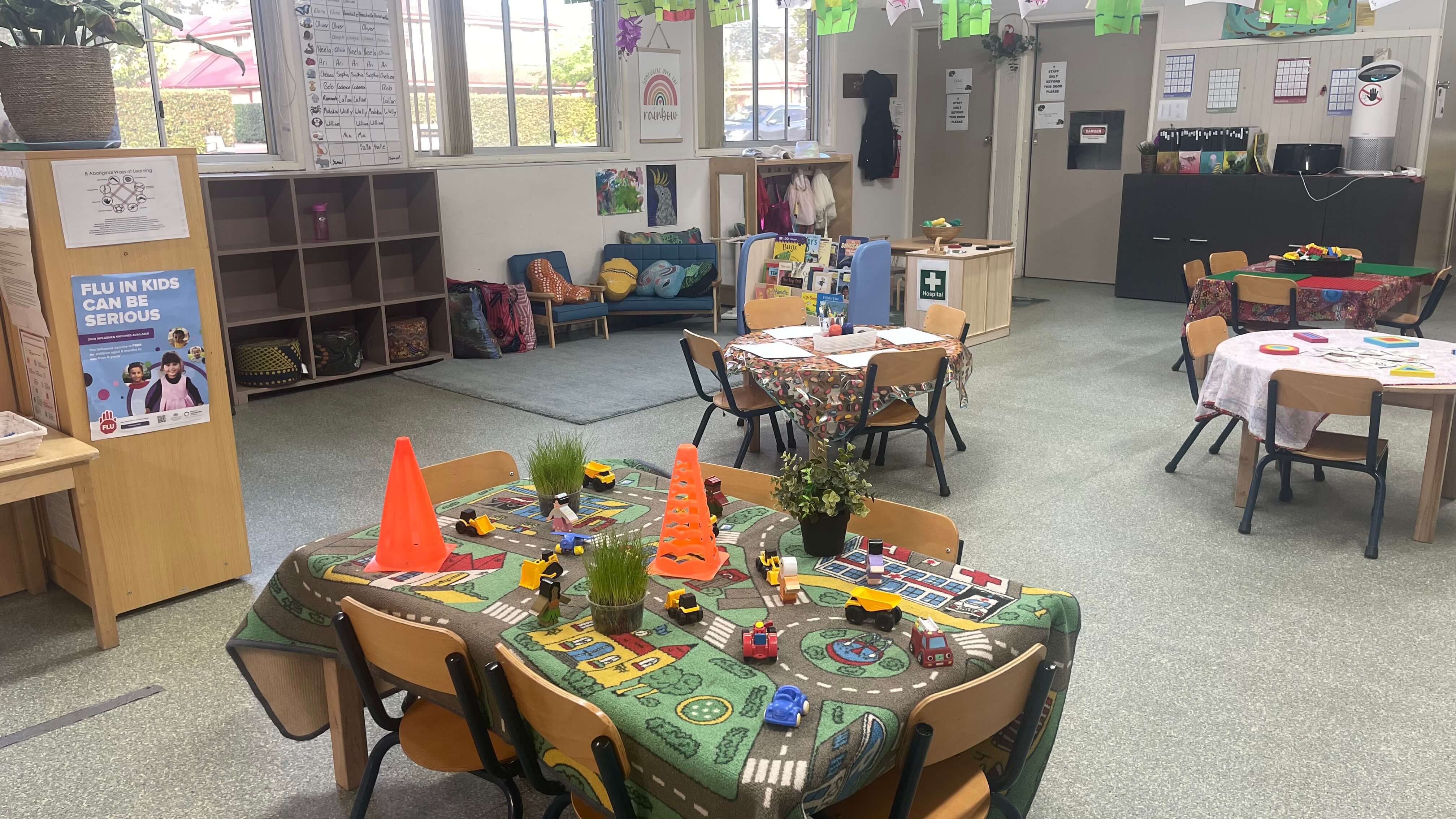Elizabeth Street Preschool, a small not for profit service in NSW, was notified about their A&R shortly after the 2022 Christmas break, providing them with about six weeks to prepare. Danielle Shepherd, who had only just assumed her role as director when the notice arrived, led the team through an intensive preparation process.
"We organised staff meetings and room meetings, engaged in research, and developed check lists and compliance lists," she recounted. In addition, she gathered insights from other local directors who had used the recently released self-assessment tool.
Based on a recommendation by representatives from the Department of Education’s continuous improvement team, Danielle and her team opted to upload their Quality Improvement Plan (QIP) through the National Quality Agenda IT System (NQA ITS).
.jpg?width=750&height=421)
The assessment visits
During the assessment visits, two approachable assessors visited the preschool. "They spent time understanding our educators, children, and families," Danielle recalls. Despite initial nerves, the team felt confident, buoyed by their thorough preparation. The assessors focused on various aspects, including compliance documentation, educator qualifications, and educator-child relationships.
Danielle highlighted the positive aspects of the assessors' interactions. "Their approachability and willingness to provide valuable advice and ideas was immensely helpful. They genuinely engaged with each educator to understand their individual philosophies," she shared.
Compared to the previous A&R she experienced at her former service, Danielle found this encounter enlightening. A crucial element was the assessment's distribution over two shorter days, avoiding the rush and stress of a single, full-day session. The presence of two officers, each with their own specific focus areas, allowed for more informative and relaxed interactions.
“The assessors made us feel very relaxed and included us in the documentation process, so we felt it reflected our service accurately,” Danielle recounted. “Having more time meant we were able to share other aspects of our service where we were excelling, and we could also have meaningful conversations that have informed our ongoing service practices and QIP.”

Post-assessment reflections
The team were told to expect to receive a copy of the outcome summary anywhere up to 6 weeks after the A&R. Following the A&R visits, the Elizabeth Preschool team celebrated their hard work with a lunch and small gifts from the committee. They received a draft outcome summary promptly and were given the opportunity to add additional information where necessary. The final summary was received a few weeks later.
Motivated by the assessment process and recommendations in the final report, the team decided to enhance their service's philosophy to include a greater emphasis on music and social justice.
“We are focusing on critical reflection and finding effective methods for documentation, while also exploring ways to enhance family involvement. Our reflections include social justice issues and fostering inclusivity in our setting. Additionally, we're deepening our ties with the local community, including Aboriginal and Torres Strait Islander peoples.”

Advice for others
 When asked what advice she would share for others undergoing A&R, Danielle emphasised the importance of relying on one's team, stating: "Your team is your most valuable asset. Place your faith and trust in them, knowing they carry out their work every day to an exceptional standard, and they will excel.
When asked what advice she would share for others undergoing A&R, Danielle emphasised the importance of relying on one's team, stating: "Your team is your most valuable asset. Place your faith and trust in them, knowing they carry out their work every day to an exceptional standard, and they will excel.
“There's no need to be anything other than your genuine selves, as this authenticity will be reflected in your interactions with children and families. Always prioritise children’s health, safety, and equity in every aspect of the curriculum," she advised.
Conclusion
The attitude and culture of the centre stem from the top, and when you have a leader dedicated to drawing out the best in their team, you'll be in the strongest position when a notice of A&R arrives.
It’s crucial to ensure the entire team is on board and possesses a clear grasp of the practices outlined in your service’s self-assessment documents. It involves a collective effort in not only understanding and implementing these practices and their link to the NQS and compliance, but also in addressing the social and emotional needs of your educators. Fostering robust positive psychology requires a comprehensive 360-degree approach. Acknowledging and expressing gratitude to each other reinforces key practices. This fosters a dynamic culture supported by educators committed to ongoing improvement.
Danielle's experiences and insights offer a valuable perspective for early education services undergoing A&R. Her focus on teamwork, authenticity, and proactive preparation are testament to her effective leadership in the realm of early childhood education.
How has your 2023 assessment and rating experience compared? Share your thoughts in the comments, or email us via info@cela.org.au
Additional tips from CELA A&R expert Kerrie Maguire
Kerrie Maguire, CELA early education specialist and assessment and ratings expert, suggests that before an authorised officer has contacted your service, it’s good practice to empower educators to ask questions about what will happen on the day.
"The process is not meant to be a mystery or a test," she says. "Ask which quality areas they are likely to begin with, which can help you to plan."
Kerrie advises directors to take a holistic approach, which includes preparing your team neurologically and having the ability to recognise your team’s emotions during the lead-up to assessment and rating, as well as on the day. "There are no real hidden gems or nuggets of gold that will put you at an advantage," she say. "You just need to instil confidence, reaffirming to the team that no one knows their service as well as they do."
She puts emphasis on setting realistic goals for what you want to achieve for each quality area based on whether those practices or strengths can be observed, discussed or sighted in the service—this is vital for managing the outcomes of A&R.
"Many educators believe their centre should be rated as Exceeding, and of course, everyone wants to be rated as Exceeding," Kerrie notes. "It's important to manage expectations to avoid disappointment and to reassure teams that achieving a Meeting rating is a positive position to be in."
In relation to casual and new educators, Kerrie suggests that directors make certain A&R processes are incorporated into their induction, ensuring they are informed about ongoing plans and related projects. As a result, they will feel more connected to the service, living and breathing its culture, processes, pedagogy, and key practices.
"Preparing all team members in this way will ensure that you are always ready for A&R, regardless of the visit notice period," she concludes.
Using SMART goals to fine tune the process:
After self-assessing agree on the goals you would like to achieve in your quality improvement plan. Consider using the SMART goals process to fine tune your thinking.
SMART goals are a powerful tool for setting and achieving objectives effectively. The acronym SMART stands for Specific, Measurable, Achievable, Relevant, and Time-bound.
Specific:
Goals should be clear and specific, so you know exactly what you're aiming for. This involves answering the who, what, where, why, and which elements of the goal.
Measurable:
It's important to have measurable goals, so you can track your progress and stay motivated. Measurable goals answer questions like how much, how many, and how will I know when it is accomplished.
Achievable:
Your goal also needs to be realistic and attainable to be successful. It should stretch your abilities but remain possible.
Relevant:
This step ensures that your goal matters to you and aligns with other relevant goals. A relevant goal can answer yes to these questions: does this seem worthwhile? Is this the right time? Does this match our other efforts/needs?
Time-bound:
Every goal needs a target date, so you have a deadline to focus on and something to work toward. This part of the SMART goal criteria helps to prevent everyday tasks from taking priority over your longer-term goals.
References:
ACECQA, Assessment and Rating Process
Training in relation to this topic:
CELA:
Prepare Your Team for Assessment and Rating
BOOK NOW
Unpacking Self Assessment and Quality Improvement
BOOK NOW
Be You:
Communities for Early Learning
Mentally Healthy Communities
Further reading:
Amplify: Our self assessment journey by Janalli BASC
Amplify: How we made our Exceeding Themes present on assessment day by Carena Hawkins, Sutherland Activity Centre